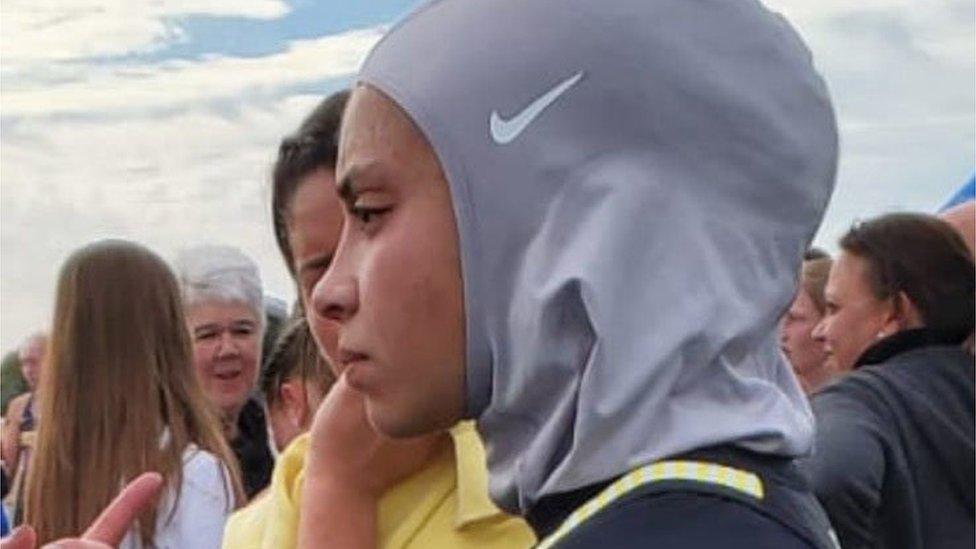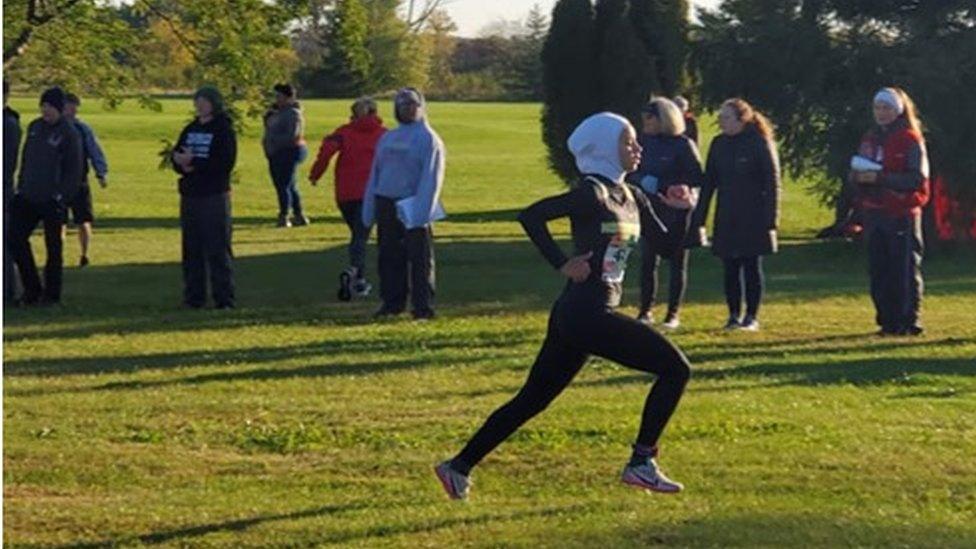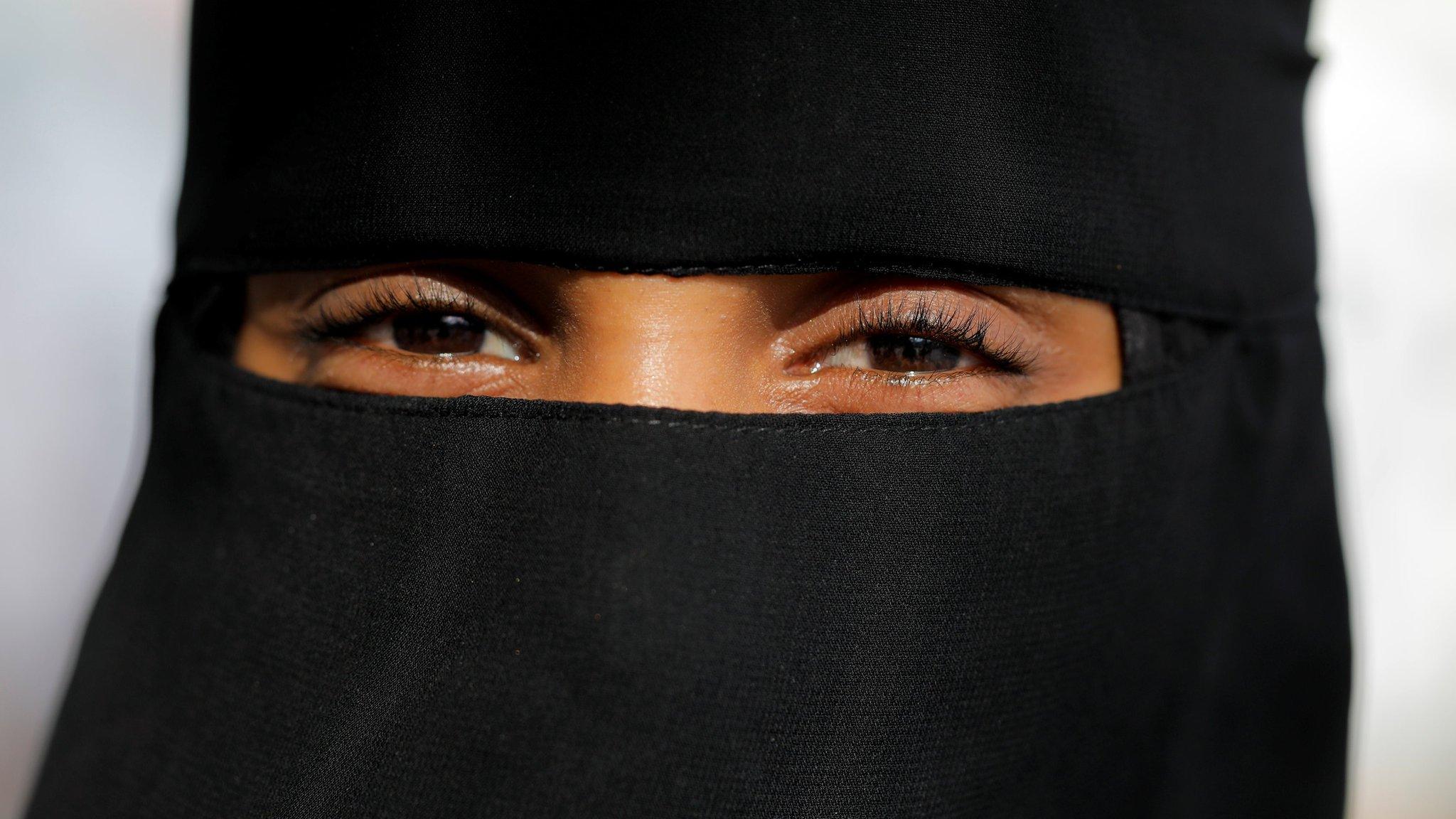Muslim teen athlete disqualified in Ohio race over hijab
- Published

Noor wore a Nike hijab designed specifically for professional athletes
A teenage Muslim athlete in the US state of Ohio has told of her devastation at being disqualified for wearing a hijab during a race.
Noor Abukaram, 16, said she had only been told her attire was against the rules after crossing the finish line.
Amid outcry, the Ohio High School Athletic Association (OHSAA) says it is looking into changing its religious waiver rules for next season.
Her story sparked a national discussion about dress codes and discrimination.
Noor had been running for the Sylvania Northview school team all season, and her hijab had never been an issue before the district level race on Saturday in Findlay, 135 miles (220km) west of Cleveland.
When officials inspected her team, they informed one of her teammates that her shorts were in violation of the rules and allowed her to change, Noor wrote in a Facebook post.
But they did not say anything about her athletic hijab, though she said she had seen her coach discussing something privately with the officials.
After finishing the 5km race with her personal best time, Noor was surprised to find her name was not on the score boards. Her teammates then told her she had been disqualified because of her hijab.
"I felt like I had got hit by a truck and punched in the gut," Noor told the BBC's Outside Source programme.
"It's not because they're looking out for my safety, or because they are concerned that I have an advantage, because I definitely don't have an advantage wearing my hijab.
"I think it's discriminatory against my religion."
‘The power of the hijab for Muslim girls in sport’
Noor says she felt "humiliated" after the race, especially since officials said nothing to her beforehand.
"I looked like a clown running that race and I only ran it for those officials," she said.
Her coach had failed to submit a religious waiver for the race, but has since filed one for Noor's upcoming regional competition, and OHSAA has accepted it.
While the association's rulebook does not specifically mention hijabs, it states religious headwear requires a waiver, local media report.
OHSAA told the BBC that they were "looking at this specific uniform regulation to modify it in the future so that religious headwear does not require a waiver".
"If the coach or school had obtained the waiver previously, all this could have been avoided. The race official was simply enforcing this rule."
The statement added that they had communicated with the school and were committed to educating coaches on all sport rules.

Noor during the Saturday race
An OHSAA spokesman told the Associated Press news agency, external that they had previously considered dropping the religious waiver requirement.
The spokesman also noted that the rule was not always enforced, including in some instances of runners wearing hats in cold weather.
Noor believes no-one should have to sign a waiver for something like a hijab.
"They don't need to alter the course for me specifically. I'm running just like everyone else, I'm starting on the same start line and finishing on the same finish line."
But she says that she's seen a lot of positive feedback from her community, and across the US. Her cousin's initial Facebook post sharing Noor's story had over 2,000 likes and 3,000 shares as of Friday.
"I'm really happy that I decided to let this story go public because it really brings out a dialogue, and a lot of different people have been reaching out to me saying that similar things have been happening to them."
On Thursday, Massachusetts senator and 2020 Democratic hopeful Elizabeth Warren also weighed in, saying: "Muslim students should never be denied participation in school activities."
Allow X content?
This article contains content provided by X. We ask for your permission before anything is loaded, as they may be using cookies and other technologies. You may want to read X’s cookie policy, external and privacy policy, external before accepting. To view this content choose ‘accept and continue’.

Controversy surrounding around athletes and hijabs is not new.
Last year, a 16-year-old basketball player in Philadelphia, Pennsylvania, was made to leave a game over her hijab, which prompted a statewide rule change, external.
Female athletes in particular have been singled out over strict dress codes.
Last month, a teenage swimmer in Anchorage, Alaska, was disqualified after winning a race on the grounds that her school-issued swimsuit had exposed too much of her bottom.
The decision was overturned following public outcry.
- Attribution
- Published8 March 2018

- Published26 February 2019

- Published7 August 2018
